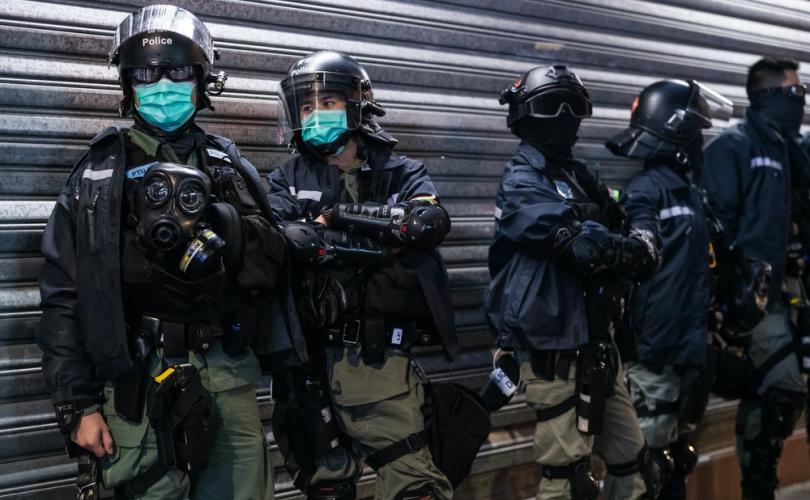New study: Coronavirus lockdowns don’t save lives
The lockdowns have also caused suicide numbers to rise

SHUTTERSTOCK.COM
By Calvin Freiburger
LifeSite News
July 31, 2020 (LifeSiteNews) – Draconian lockdowns of the type adopted in many American states are less effective at combating COVID-19 than strategies more narrowly targeted at those most in danger, according to a study of 10 different nations released this week by the conservative Heritage Foundation.
The comparative analysis looks at the responses to the coronavirus outbreak employed by the United States, Germany, Australia, New Zealand, South Korea, Italy, Iceland, Norway, Sweden, and Iran.
It first found that while the U.S. leads the free world in confirmed cases per capita (China’s numbers are believed to be higher, but there are serious doubts as to the credibility of the authoritarian regime’s official data), and has suffered 200 time the daily deaths of North Korea since June 1 despite having one-fourteenth the population density.
However, it also cautioned that the comparison was potentially misleading, as the U.S. consists of 50 different states which have adopted a range of different responses, and that U.S. cases and deaths are both “highly concentrated in a few, mostly heavily populated, areas.” For example, New York was America’s most hardest-hit state, thanks in part to Democrat Gov. Andrew Cuomo forcing nursing homes to take in COVID-19 patients, despite elderly residents’ heightened vulnerability to the virus.
Internationally, the study found: “Some countries that eschewed lockdown policies and relied on more targeted approaches, such as South Korea and Iceland, have experienced outcomes even better than those that have relied on the more severe lockdown approach,” while the “fact that Australia and New Zealand, two similar countries, approached the COVID-19 pandemic so differently, yet had similar outcomes, suggests that alternatives to the most restrictive forms of lockdowns have merit, even in the short run.”
“Specifically, Australia had 13,595 COVID-19 cases (0.0534% of its population) and 139 deaths (0.000546% of its population), while New Zealand had 1,556 cases (0.0323% of its population) and 22 deaths (0.000457% of its population),” authors Andy Vanderplas and Kevin Dayaratna write. “However, New Zealand’s unemployment level is forecast to increase to 9.2% by December, while Australia’s is expected to increase to 7.6% over this same time period.”
Both nations responded to their outbreaks by recommending “social distancing,” restricting entry to the country by foreign nationals and employing smartphone apps for contact tracing. But Australia “has encouraged schools to remain open for in-person classes as much as possible” and allowed “important industries, such as construction and mining” to keep operating, whereas New Zealand’s Alert Levels 3 and 4 “highly restrict New Zealanders’ economic freedom and travel.”
In another instructive comparison, “South Korea permitted much of its economy to remain open, choosing instead to engage in aggressive testing and isolating the infected,” yielding “13,979 cases and 298 deaths (0.0272% and 0.000579% of its population, respectively” as of July 22. By contrast, “Italy pursued a strict lockdown policy,” and by the same date “had 245,590 cases and 35,097 deaths (0.406% and 0.058% of its population, respectively).”
“Maintaining a strong economy and protecting public health are not mutually exclusive,” the authors conclude. “Focusing on hot spots, protecting the elderly and most vulnerable, utilizing isolation centers to prevent the virus from spreading, taking advantage of contact tracing, and engaging in appropriate testing are policies lawmakers should consider in the coming months.”
The lockdowns across the United States, which have been mandated at the state level but are based in large part on recommendations by the Trump administration, have come with severe consequences for both the economy and other aspects of public health, thanks to Americans being temporarily forbidden from working in “non-essential” jobs, which yields anxiety, as well as the mental and emotional fallout from prolonged social isolation.
“We’re seeing, sadly, far greater suicides now than we are deaths from COVID,” U.S. Centers for Disease Control & Prevention director Dr. Robert Redfield acknowledged this month. “We’re seeing far greater deaths from drug overdose that are above excess that we had as background than we are seeing the deaths from COVID.”
___
https://www.lifesitenews.com/news/covid-19-lockdowns-dont-save-lives-heritage-study-finds
